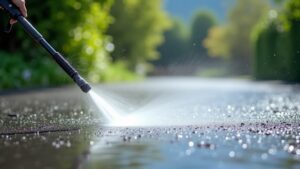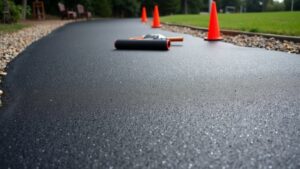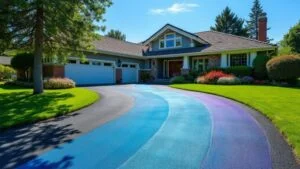When selecting a driveway surface, evaluate concrete, asphalt, gravel, brick, and chip seal options based on your needs. Concrete is highly durable and low-maintenance but more expensive. Asphalt offers a balance of cost and longevity, though it requires periodic resealing. Gravel is cost-effective and drains well but needs regular replenishment. Brick is aesthetically pleasing and durable, yet pricey. Chip seal provides a rough texture for traction at a lower cost, but it’s best for low-traffic areas. Consider factors like climate, budget, and desired aesthetic to make an informed choice. Continue to uncover more detailed insights for your perfect driveway solution.
Key Takeaways
- Concrete driveways are highly durable, enhance curb appeal, but require regular maintenance like resealing every 2-3 years.
- Asphalt driveways are cost-effective, durable, and low maintenance but typically last only 15 to 30 years.
- Gravel driveways offer a rustic look and excellent drainage but need periodic replenishment and re-leveling.
- Brick driveways are long-lasting and aesthetically pleasing but have higher initial costs ranging from $10 to $30 per square foot.
- Chip seal driveways are budget-friendly and provide good traction but are best suited for low-traffic areas.
Overview of Driveway Surfacing
Resurfacing your driveway involves applying a new layer of material like asphalt or concrete to restore its condition and enhance its appearance. This process is crucial for prolonging the lifespan of your driveway, providing a smooth surface, and safeguarding it from further wear and tear.
Driveway resurfacing begins with cleaning the existing surface to remove debris and dirt, guaranteeing proper adhesion of the new layer. Any cracks or holes are patched, creating a solid base for the resurfacing material.
Asphalt and concrete are two popular choices for resurfacing due to their durability and cost-effectiveness. Asphalt offers a smooth surface and is generally quicker to install and cure. It’s also more flexible, which makes it less prone to cracking under heavy loads. However, it requires regular maintenance and may not last as long as concrete.
Concrete, on the other hand, is known for its longevity and minimal maintenance needs. It provides a durable, smooth surface but can be more expensive and time-consuming to install. Understanding the pros and cons of each material can help you make an informed decision to safeguard your driveway effectively.
Proper maintenance post-resurfacing, including regular cleaning and crack filling, ensures its longevity.
Types of Driveway Materials
In conclusion, when selecting driveway materials, it’s important to take into account the durability, maintenance requirements, and aesthetic appeal of each option. Among the types of driveways, an asphalt driveway stands out for its balance of cost-effectiveness and durability, lasting 12-15 years, which can extend to 20 years with proper sealant application.
Concrete or asphalt are popular choices, but if you need to resurface your driveway, asphalt is generally easier and less expensive to repair.
For those with long driveways, gravel (loose shingle) is a low-cost and environmentally friendly option. Its permeable nature also aids drainage, though it may require periodic replenishing. Resin-bound driveways provide a durable and visually appealing surface that can last up to 25 years while offering excellent drainage properties.
Tar and Chip driveways offer a rough surface, enhancing traction, and typically last up to 10 years. They’re a practical option if you prefer a textured finish.
Finally, block paving driveways can be customized with various colors and patterns, providing a low-maintenance and adaptable solution.
Consider these factors carefully to choose the best material for your needs.
Concrete Driveways
Concrete driveways offer a highly durable and long-lasting solution, capable of lasting over a century with proper maintenance. Their exceptional durability makes them a prime choice for homeowners seeking a long-term investment. To maintain a concrete driveway, you should perform annual cleaning and resealing every 2-3 years. This regular maintenance minimizes the need for more extensive resurfacing efforts and helps preserve the driveway’s integrity.
Another significant advantage of a concrete driveway is its ability to enhance the curb appeal of your home. Its versatile appearance can complement various architectural styles, making it an aesthetically pleasing addition to your property.
Additionally, the cost-effectiveness of concrete driveways can’t be overstated. With installation costs ranging from $4 to $15 per square foot, they present a financially viable option compared to other materials.
Asphalt Driveways
Asphalt driveways provide a durable and cost-effective surfacing option, especially suited for regions with colder climates. These driveways typically last between 15 to 30 years, offering remarkable durability that withstands the freeze-thaw cycles common in such areas.
The black surface of asphalt not only looks sleek but also contributes to faster snow and ice melt due to its heat-retentive properties.
From a financial perspective, asphalt driveways are quite affordable, with installation costs ranging from $7 to $15 per square foot. This makes them a more budget-friendly option compared to concrete, while still delivering high-performance results. The cost-effectiveness of asphalt driveways is further enhanced by their low maintenance requirements.
Maintenance involves periodic cleaning every two years and resealing every one to three years, which helps to protect the surface from cracks and other damage. This ongoing care helps to ensure the driveway remains in good condition, extending its lifespan and maintaining its visual appeal.
For homeowners in cold climates seeking a practical and economical solution, asphalt driveways stand out as a top choice, balancing durability and cost-effectiveness with minimal maintenance needs.
Gravel Driveways
Switching from the durability of asphalt, gravel driveways offer a flexible and cost-effective alternative with a natural, rustic aesthetic. Gravel driveways are straightforward to install, making them an attractive option for those looking to minimize upfront labor and expenses.
You can choose from various color and stone size options to match your property’s unique style, enhancing its natural look. A significant advantage of gravel driveways is their ability to facilitate water flow. This design helps limit pooling and reduces the risk of shifting, which is particularly beneficial in regions with heavy rainfall.
Additionally, gravel driveways are the least expensive option for long driveways, costing between $1.25 to $1.80 per square foot, making them a budget-friendly choice. However, regular maintenance is essential to keep gravel driveways in their best condition. Over time, gravel can become displaced due to vehicle traffic and weather conditions, requiring periodic replenishment and re-leveling.
Despite this, the cost-effective nature and the natural, rustic appearance often outweigh the maintenance demands for many homeowners. This makes gravel driveways a viable option for those seeking both functionality and aesthetic appeal.
Brick Driveways
Brick driveways offer a durable and visually appealing option that can greatly enhance your property’s curb appeal. When you choose a brick driveway, you’re investing in a long-term solution that can last between 50 to 100+ years. This longevity makes brick driveways a wise long-term investment. They are also weather-resistant, capable of withstanding various climatic conditions with minimal maintenance required.
| Feature | Description |
|---|---|
| Durability | Lasts 50-100+ years |
| Curb Appeal | Enhances property value and aesthetics |
| Weather Resistance | Withstands all weather conditions |
Brick driveways are known for their timeless aesthetic, which can significantly boost your home’s curb appeal. The initial cost ranges from $10 to $30 per square foot, depending on the design and materials used, but this is offset by their longevity and low maintenance requirements.
Another significant advantage is their easy repairability. If a brick gets damaged, you can replace it without disturbing the rest of the driveway. This feature not only saves you money but also ensures that your driveway always looks its best. For homeowners seeking a blend of durability and charm, brick driveways are an excellent choice.
Chip Seal Driveways
For those seeking a cost-effective and durable driveway solution, chip seal driveways offer an appealing blend of affordability and longevity. Chip seal driveways are typically priced between $5 to $10 per square foot, making them a budget-friendly option compared to other surfacing choices.
This type of driveway is particularly suitable for low-traffic areas. The rough surface texture provides excellent traction, ensuring that vehicles maintain a secure grip. The durability of chip seal driveways surpasses that of gravel driveways, requiring minimal maintenance over time.
Here are some key benefits of chip seal driveways:
- Cost-effective: Priced affordably, they offer significant savings compared to other materials.
- Durability: They last longer than gravel driveways and withstand wear and tear effectively.
- Traction: The rough texture offers solid grip, reducing the risk of slipping.
- Low-traffic suitability: Ideal for driveways with infrequent use.
- Longevity: Known for their extended lifespan, they maintain their integrity over the years.
Choosing the Right Driveway
Selecting the right driveway involves analyzing multiple factors such as budget, climate, design preferences, and maintenance capabilities.
When choosing a driveway, start by considering your budget constraints. Driveway materials like concrete, asphalt, and pavers vary greatly in cost. Factor in not only initial installation costs but also long-term maintenance expenses.
Climate plays an important role in your decision. For instance, if you live in an area prone to freezing and thawing, asphalt may be more suitable due to its flexibility. Conversely, concrete can crack under such conditions. Water damage is another consideration; make sure proper drainage is in place to prevent pooling and erosion.
Your design options should complement your home’s aesthetics. A well-chosen driveway can enhance curb appeal, making your property more attractive. Materials like pavers offer a range of colors and patterns, while concrete allows for stamping and staining.
Maintenance capabilities are also crucial. Some materials require frequent sealing or cleaning. Consider how much time you’re willing to invest in upkeep.
Conclusion
So, what’s the best driveway surface for you? Each material has its unique benefits and drawbacks, making the choice complex.
Concrete is durable but costly. Asphalt offers flexibility but requires maintenance. Gravel is budget-friendly but less stable. Brick is aesthetically pleasing but can be pricey. Chip seal provides a rustic look but isn’t as durable.
Your decision hinges on your priorities—longevity, cost, or appearance. Ready to make the best choice for your driveway?
Carlisle, PA Residents: Elevate Your Property’s Curb Appeal!
Are you based in Carlisle, PA, and looking to enhance your home’s curb appeal? Nathan’s Paving specializes in high-quality driveways that not only look great but also stand the test of time. From asphalt paving to brick driveways, we provide solutions that suit every budget and preference. Get your free quote today and see how we can transform your driveway into a stunning entrance to your home. Click here to get started.



